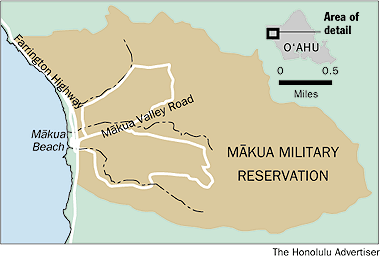
By William Cole
Advertiser Staff Writer
A federal judge yesterday said she will rule by the end of the week whether to dismiss a lawsuit challenging the Army’s Dec. 12 finding that live-fire training would not significantly affect Makua Valley.
U.S. District Judge Susan Oki Mollway already has said that she is inclined to let the lawsuit stand. Yesterday, the judge questioned a lawyer for the Army about its contention that the December finding of "no significant impact" was only a preliminary one, and therefore, the lawsuit is "not ripe" to proceed.
If Mollway allows the suit to continue, it could delay any attempts by the Army to resume training at the Makua Military Reservation. Live-fire training was suspended there in September 1998.
The issue has been a sore spot for Leeward residents, who have raised environmental and cultural concerns about the training. The 4,190-acre valley is home to 34 endangered species and a number of Hawaiian archaeological sites. Nearly 500 people gathered Jan. 27 to discuss the issue at a meeting that lasted nearly 11 hours.
In December, the Army said it planned to move forward with a modified approach to training that could have put soldiers back in Makua as early as March. But earlier this month in the face of mounting public pressure, the Army withdrew its Dec. 12 findings and said it would reconsider the environmental assessment — a less-comprehensive examination than the full-blown environmental impact statement some residents want.
Asked yesterday by Mollway whether the Army felt it had a right to take any action based on the Dec. 12 findings, Lt. Col. David Howlett, a lawyer, said no. And Howlett argued that the lawsuit filed by environmental groups Malama Makua and the Earthjustice Legal Defense Fund on Dec. 20 should be dismissed in part because the December assessment was not a final one.
Howlett said such an assessment normally is the final action, but in this case, it wasn’t. When a final decision is made, Howlett said, the Army will be obligated to wait 30 days, providing time for any legal action.
"Here, the government said, we’ve got this (assessment), but we need to do more public participation," Howlett said. "We need to complete that public participation before we can go final with our decision."
Asked by Mollway why the Army withdrew the assessment if it wasn’t final anyway, Howlett said, "That’s a good point, your honor." Howlett also admitted the assessment was "inartfully" drafted, and said the confusion would not happen again.
Paul Achitoff, an Earthjustice attorney, said the Army is getting into, "we intended this, and we intended that." The assessment was a final agency action, Achitoff said.
"Basically, they are trying to blame us for suing them for their inartful document," Achitoff said. "We wouldn’t have sued them if they told us there was literally no way they would resume live-fire training until some specific later date."
Howlett said the Army could arrive at different results in a final assessment, but also admitted the same results could be reached. If there is a full-blown environmental impact statement, there would be a "great deal" of public input, Howlett said.
Army spokeswoman Maj. Cynthia Teramae said beginning early next month, the Army wants to discuss with community leaders 14 points of concern that came out of the January meeting.
"That’s really the stage we’re at right now," Teramae said. "We want to make sure we’ve adequately addressed the community’s concerns."
Achitoff, in court papers, said the lawsuit should remain alive, with proceedings stayed until the Army makes its final decision.
Mollway said on a federal court Web site before yesterday’s hearing that she was inclined to rule the "no significant impact" finding and environmental assessment were final agency actions, and therefore, the lawsuit can be reviewed by the court.
[back to top] |

